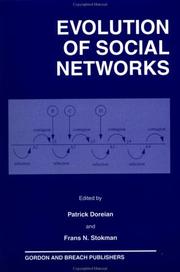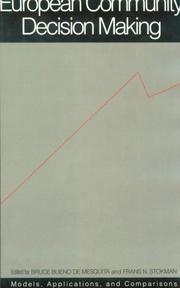| Listing 1 - 7 of 7 |
Sort by
|
Book
ISBN: 0745601154 9780745601151 Year: 1985 Publisher: Cambridge
Abstract | Keywords | Export | Availability | Bookmark
 Loading...
Loading...Choose an application
- Reference Manager
- EndNote
- RefWorks (Direct export to RefWorks)
Sociology of organization --- Firms and enterprises --- Economic sociology --- Political sociology --- Interlocking directorates --- Directors of corporations --- Corporate power --- 658.114 --- patronaat --- geïndustrialiseerde wereld --- -Directors of corporations --- -Interlocking directorates --- -65.01 --- Combinations, Industrial --- Combinations in restraint of trade --- Directorates, Interlocking --- Industrial concentration --- Cartels --- Corporate directors --- Corporation directors --- Corporations --- Corporate governance --- Power (Social sciences) --- Forms of enterprise in general. Private businesses --- 338.9 --- 403 --- Methods and methodology. Theory and practice of organization --- 65.01 Methods and methodology. Theory and practice of organization --- 658.114 Forms of enterprise in general. Private businesses --- 65.01 --- Bedrijven. Beheer / en Integratie (Economische). --- Dirigeants d'entreprises. Europe occidentale. --- Entreprises. Gestion / et intégration économique. --- Bedrijfsleiders. Europa (West-). --- Interlocking directorates - Europe --- Directors of corporations - Europe --- Corporate power - Europe
Book
ISBN: 9028602275 Year: 1977 Publisher: Leyden
Abstract | Keywords | Export | Availability | Bookmark
 Loading...
Loading...Choose an application
- Reference Manager
- EndNote
- RefWorks (Direct export to RefWorks)
United Nations law --- International groups --- 341.123 --- 339.96 --- United Nations --- Developing Countries --- #SBIB:327.7H123 --- United Nations.Verenigde Naties--(algemeen) --- Ontwikkelingshulp. Ontwikkelingssamenwerking. Ontwikkelingsproblematiek --- Voting. --- Foreign relations. --- Verenigde Naties: problematiek Verenigd Naties – niet-leden --- 339.96 Ontwikkelingshulp. Ontwikkelingssamenwerking. Ontwikkelingsproblematiek --- 341.123 United Nations.Verenigde Naties--(algemeen) --- UN --- UNO --- Developing countries --- Naciones Unidas --- Nations Unies --- ONU --- Organisation des Nations Unies --- Organizat︠s︡ii︠a︡ Obʺedinennykh Nat︠s︡iĭ --- OON --- Vereinigte Nationen --- Umot ha-meʼuḥadot --- Organizacja Narodów Zjednoczonych --- ONZ --- Forente nasjoner --- Forenede nationer --- FN --- Förenta nationerna --- Gaertʻianebuli erebi --- Organização das Nações Unidas --- PBB --- Perserikatan Bangsa-Bangsa --- Kokusai Rengō --- Kokuren --- ENSZ --- Egyesült Nemzetek Szövetsége --- Birleșmiș Milletler Teșkilâtı --- Birlăşmiş Millătăr Tăşkilatı --- Birlashgan Millatlar Tashkiloti --- BMT --- YK --- Yhdistyneet kansakunnat --- OUN --- Organizacija Ujedinjenih Nacija --- NU --- Nazioni Unite --- OSN --- Organizace spojených národů --- Sāzmān-i Milal-i Muttafiq --- Bangsa² Bersatu --- Organización de las Naciones Unidas --- Ühinenud Rahvaste Organisatsioon --- ÜRO --- Organismos tōn Hēnōmenōn Ethnōn --- Umoja wa Mataifa --- Vereinten Nationen --- Vereinte Nationen --- Hayʼat al-Umam al-Muttaḥidah --- Verenigde Naties --- VN --- Organizația Națiunilor Unite --- Um --- Lien ho kuo --- OKB --- Organizata e Kombeve të Bashkuara --- Lian he guo --- U.N. --- Umam al-Muttaḥidah --- OĒE --- Hēnōmena Ethnē --- Organizácia Spojených Národov --- Sahaprachāchāt --- Națiunile Unite --- Organizat︠s︡ii︠a︡ na obedinenite nat︠s︡ii --- Organismos Hēnōmenōn Ethnōn --- Manẓūmat al-Umam al-Muttaḥidah --- AAN --- Arhanizatsyi︠a︡ Ab'i︠a︡dnanykh Natsyĭ --- Nações Unidas --- Orhanizat︠s︡ii︠a︡ Ob'i︠e︡dnanykh Nat︠s︡iĭ --- O.Ē.E. --- ʻOngkān Sahaprachāchāt --- Sjuninejal Konob'laq --- Sāzmān-i Milal-i Muttaḥid --- Milal-i Muttaḥid --- Nėgdsėn U̇ndėstniĭ Baĭguullaga --- NUB --- Rāshṭrasaṃgha --- או״מ --- أمم المتحدة --- الأمم المتحدة --- سازمان ملل متحد --- 国際連合 --- 联合囯 --- 聯合國 --- United Nations Organization --- Liên Hiệp Quó̂c --- Liên Hợp Quó̂c --- LHQ --- Kula Samagga --- YūʼAṅʻnʻ --- 联合国 --- Организация на обединените нации --- Организация Объединённых Наций

ISBN: 9056995383 Year: 1997 Publisher: Amsterdam Gordon and Breach
Abstract | Keywords | Export | Availability | Bookmark
 Loading...
Loading...Choose an application
- Reference Manager
- EndNote
- RefWorks (Direct export to RefWorks)
Taken from a special issue of the journal 'Mathematical Sociology', 'Evolution of Social Networks 'answers the question of whether we can apply evolutionary theories to our understanding of the development of social structures. Social life emerges as soon as persons establish relations with each other. Regardless of the specific social processes, these relations evolve into networks with coherent structures, structures that provide some actors with opportunities for action while impeding the progress of others. Social networks have increasingly become the focus of many social scientists as a way of analyzing these social structures. While many powerful network analytic tools have been developed and applied to a wide range of empirical phenomena, understanding the evolution of social organization still requires theories and analyses of social network evolutionary processes. Researchers from a variety of disciplines have combined their efforts in what is an indication of some very promis
Primary groups --- Social networks. --- Sociometry. --- Réseaux sociaux --- Sociométrie --- Réseaux sociaux --- Sociométrie

ISBN: 0300057598 Year: 1994 Publisher: New Haven, Conn. Yale University Press
Abstract | Keywords | Export | Availability | Bookmark
 Loading...
Loading...Choose an application
- Reference Manager
- EndNote
- RefWorks (Direct export to RefWorks)
International relations. Foreign policy --- European Union --- Policy sciences --- Decision making --- Sciences de la politique --- Prise de décision --- -Political planning --- -#SBIB:35H411 --- #SBIB:002.IEB --- #SBIB:327.7H220 --- Planning in politics --- Public policy --- Planning --- Politics, Practical --- Public administration --- Deciding --- Decision (Psychology) --- Decision analysis --- Decision processes --- Making decisions --- Management --- Management decisions --- Choice (Psychology) --- Problem solving --- Beleidscyclus: voorbereiding (inclusief planning) --- Europese Unie: instellingen en besluitvorming --- Political planning --- Prise de décision --- European Union countries --- Policy sciences - European Economic Community countries. --- #SBIB:35H411

ISBN: 052167994X 0521861896 9780521679947 9780521861892 9780511492082 0511246242 9780511246241 9780511246937 0511246935 0511244789 9780511244780 051124553X 9780511245534 0511492081 9786610702695 6610702691 1107168384 1280702699 0511318804 Year: 2006 Publisher: Cambridge Cambridge University Press
Abstract | Keywords | Export | Availability | Bookmark
 Loading...
Loading...Choose an application
- Reference Manager
- EndNote
- RefWorks (Direct export to RefWorks)
European legislation affects countless aspects of daily life in modern Europe but just how does the European Union make such significant legislative decisions? How important are the formal decision-making procedures in defining decision outcomes and how important is the bargaining that takes place among the actors involved? Using a combination of detailed evidence and theoretical rigour, this volume addresses these questions and others that are central to understanding how the EU works in practice. It focuses on the practice of day-to-day decision-making in Brussels and the interactions that take place among the Member States in the Council and among the Commission, the Council and the European Parliament. A unique data set of actual Commission proposals are examined against which the authors develop, apply and test a range of explanatory models of decision-making, exemplifying how to study decision-making in other political systems using advanced theoretical tools and appropriate research design.
Government --- European Union --- 260 Europese Unie --- Decision making --- Legislation --- Legislative process --- Law --- Deciding --- Decision (Psychology) --- Decision analysis --- Decision processes --- Making decisions --- Management --- Management decisions --- Choice (Psychology) --- Problem solving --- Social Sciences --- Political Science
Book
Year: 1984 Publisher: Deventer Van Loghum Slaterus
Abstract | Keywords | Export | Availability | Bookmark
 Loading...
Loading...Choose an application
- Reference Manager
- EndNote
- RefWorks (Direct export to RefWorks)
Book
Year: 1999 Publisher: Groningen: Rijksuniversiteit Groningen,
Abstract | Keywords | Export | Availability | Bookmark
 Loading...
Loading...Choose an application
- Reference Manager
- EndNote
- RefWorks (Direct export to RefWorks)
| Listing 1 - 7 of 7 |
Sort by
|

 Search
Search Feedback
Feedback About UniCat
About UniCat  Help
Help News
News